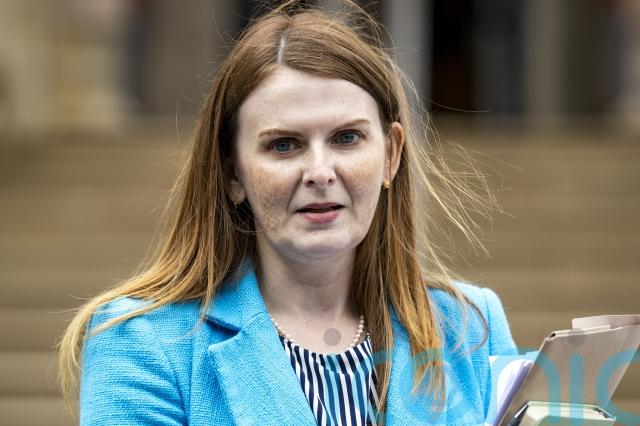
No Stormont ministers have received the funding they asked for in the budget agreed by the powersharing Executive, Finance Minister Caoimhe Archibald has said.
In her first draft budget, Ms Archibald has allocated around £14.5 billion in resource spending and £2.1 billion for capital projects in Northern Ireland.
The agreement provides £25 million for a childcare strategy. Currently, there is no scheme in place for free childcare in Northern Ireland.
Education Minister Paul Givan previously told the Assembly a fully funded early learning and childcare strategy could cost up to £400 million a year.
The budget was agreed following a lengthy Executive meeting on Thursday, although the Ulster Unionist Health Minister Robin Swann voted against it and the Alliance Party has also been critical.
In her budget statement, Ms Archibald said: “No department has received the level of funding it has bid for.
“With increased demands on services and rising costs, I recognise these allocations won’t provide sufficient funding for departments to do everything they want – that is regrettable.
“However, this budget demonstrates the commitment of the Executive – despite the severity of the financial challenges facing us – to work together to make tough choices and demonstrate the leadership that people rightly expect.”
Department of Finance officials had previously warned that the demands from ministers for funding far outstripped the money available in the budget.
In the resource budget, Ms Archibald had £1 billion to allocate once previously earmarked funding was provided. Her department had received funding bids from ministers totalling £3.2 billion.
From her capital budget, the available allocation was around £1 billion short of the bids made.
Health gets the biggest share of the resource budget, receiving £7.76 billion (51.2%) of the total amount allocated to departments for day-to-day costs.

The Department of Finance said this is an increase of 6.3% based on the previous year’s health budget, not accounting for inflation or additional funding received through Barnett consequentials.
However, Mr Swann has insisted that the total represents a 2.3% cut in spending from the previous year in real terms.
Ms Archibald said the budget underlines the Executive’s commitment to health.
Education has received almost a fifth of the resource funding, receiving £2.87 billion, an increase of 11.5% from the previous financial year.
The Department of Justice has been allocated £1.26 billion, an increase of 8.3%.
However, Justice Minister Naomi Long said her allocation would place “significant limitations” on the delivery of services, pointing to challenges including a rising prison population, low police officer numbers and increases in legal aid payments.
The Department for Communities has been allocated £856 million (up 1.6%), the Department for the Economy receives £766.6 million (up 1.5%), the Department of Agriculture, Environment and Rural Affairs gets £577.3 million (up 6.1%), the Department for Infrastructure gets £559.5 million (up 7.3%) while the Executive Office will receive a budget of £183.2 million (up 5.8%).
Some of the funding increases are funded partly through the financial package provided by the UK Government to support the return of the Stormont powersharing institutions earlier this year.
The Finance Minister’s own department is the only one to have its budget cut, with a reduction of 6.4%.
Outlining capital funding allocations, Ms Archibald said: “The draft budget allocates £2.1 billion of capital funding.
“While this isn’t sufficient to meet all the demands, it will provide investment in our hospitals, school estate, roads and transport network, as well as social housing.
“This includes £181m for Executive flagship projects including the A6, the Mother and Children’s Hospital, the Belfast Transport Hub, the Sub-Regional Stadia programme and Casement Park, as well as a new Learning Development Centre for the Fire and Rescue Service, £88.5m will support the much-needed delivery of the A5 road scheme, while £20m will support the Strule Campus.
“These projects will support the construction industry, unlock economic benefits and make a hugely positive impact on people’s lives here.”
Ms Archibald said she would continue to make the case to the Treasury for more investment in public services in Northern Ireland.
She said: “The Executive recognises the need for transformation and the reform of our public services. To do that, we need upfront investment.
“I will continue to make the case to the British Government that the Executive must be properly funded to put the Executive’s finances on a sustainable footing, that we need to be provided with a multi-year budget which enables long-term planning for service delivery and have the appropriate powers to be able to deliver high-quality public services and support workers and families.”
The budget covers the 2024/25 financial year.
The Finance Minister cannot currently legally introduce a multi-year budget as this is the last year of a Treasury spending review period.
Now that the budget allocations have been agreed by the Executive, department officials will begin work on the more detailed budget document.
Once that is published later in the spring, the Finance Minister will bring a Budget Bill to the Assembly, which sets the legal limit of departmental expenditure.
Subscribe or register today to discover more from DonegalLive.ie
Buy the e-paper of the Donegal Democrat, Donegal People's Press, Donegal Post and Inish Times here for instant access to Donegal's premier news titles.
Keep up with the latest news from Donegal with our daily newsletter featuring the most important stories of the day delivered to your inbox every evening at 5pm.